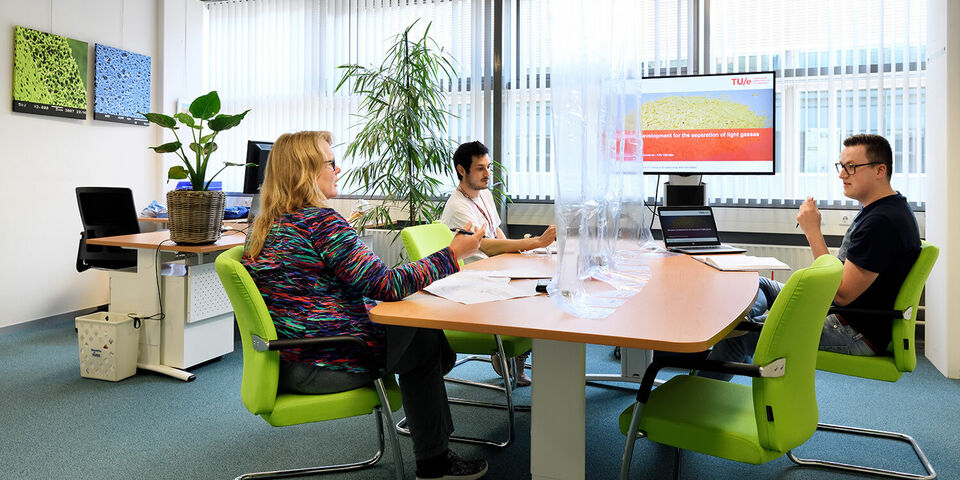What are the advantages of meeting-free weeks?
TU/e plans to schedule two meeting-free weeks in the spring of 2023, preferably during the week after carnival and the week between Ascension Day and Pentecost. During this period, employees will have more time to initiate spontaneous contacts, to reflect, or to work uninterruptedly for once. The idea is that it will make some room in people’s often overbooked agendas, and that it will help reduce physical and mental stress. Could this initiative help reduce work pressure?
TU/e announced its first meeting-free weeks, to be implemented university wide, in its Strategy Update today. “Meeting-free weeks can definitely make it easier to regulate certain affairs and to improve planning, but it won’t be enough to tackle the problem of high work pressure at our university,” Ellen Konijnenburg, member of staff faction PUR, said during the most recent University Council meeting.
On behalf of the University Council she asked the Executive Board about its plans to implement these meeting-free weeks later this academic year. Her own department of Mathematics and Computer Science implemented this initiative two years ago already (see the panel below the article).
Won’t these weeks lead to additional work stress, the council wondered. After all, certain topics might remain unaddressed, or they might get postponed only to be added to future meetings. And will meetings with other departments or external partners go ahead as planned, or will they be rescheduled a week earlier or later, which might only lead to even more work stress during those weeks?
Consultation with unions
The Executive Board informed the University Council that the meeting-free weeks are the result of a previous consultation with the unions, and that mention is made of these weeks in the most recent collective labor agreement. The board agrees with the council that it is unlikely that the implementation of these meeting-free weeks will fully resolve the problem of work pressure. ‘We do however believe that it will lead to more awareness of this issue, and that it will start a discussion about whether we really need all those meetings and about their effectiveness. It could be a small step towards reducing work pressure,’ it says in the board’s written answer to the questions.
The board writes the following about the potential risk of rescheduling meetings to a later date: ‘The idea is not to postpone meetings, but to cancel them altogether.’
Work pressure and wellbeing
Ineke van der Vegt, policy officer at Human Recourses Management, is a member of the working group tasked with improving staff wellbeing, which includes meeting-free weeks. Van der Vegt: “The implementation of these weeks is a recommendation. Some departments have already implemented and scheduled them. But it works best, obviously, when we integrate these weeks into the university’s overall meeting calendar, long before the start of the academic year, so that everyone will have a meeting-free week in their agendas at the same time. This year, we were too late.”
When it comes to holding meetings, there is still a lot to be gained, Van der Vegt says, “because we sure love to hold meetings here at TU/e, and there are more effective ways to do this. First, you need a good meeting agenda, so that the discussion topics will be clear to everyone, and so that everyone knows what the purpose of the meeting is: to inform, to discuss, or to make decisions. Only then can you properly prepare for a meeting. A good chair is essential too, as is time management, i.e., making sure that you stick to the timetable. But perhaps even more important is the following, basic question: do we really need to hold this meeting, or do we continue to hold it simply because it has become a habit? It’s good to ask yourself this question from time to time.”
Centralized coordination
During the coming period, a working group at HRM will work on a proposal on what the university hopes to achieve in terms of work pressure and wellbeing over the next five years. Van der Vegt: “Everyone at TU/e works extremely hard. One of the reasons is that the average employee is deeply committed and motivated, but I believe that certain things can be handled more effectively. Several people are coming up with solutions to tackle the problem of work pressure. But with more focus, more exchange and more centralized coordination, others will benefit from this knowledge as well. And let us also document these processes in a proper and transparent manner, so that everyone can find information at one, central location. That, too, is more efficient in the long run. In the current situation, all that information is still locked up in people’s heads too often.”
The proposal is to schedule two meeting-free weeks this academic year: one in the week after the carnival break (from February 27 until March 3) and one between Ascension Day and Pentecost (from May 22 until May 26). Van der Vegt hopes that the meeting-free weeks will become a permanent part of the meeting calendar as of 2024.
“Signal that we take work pressure seriously”
Managing director Robert van der Drift’s department of Mathematics and Computer Science started working with meeting-free weeks two years ago. “We copied the idea from Utrecht University, after one of our professors informed us about it. We started with two weeks, but by now we have at least three such weeks. During this period, our people have more time to focus on personal things, and we also think of it as a signal that we take work pressure seriously. Without believing, incidentally, that this will solve everything. We also suggest to people that they can take these three weeks off if they want to. That creates a bit more room in our leave schedule.”
He can’t think of any disadvantages. “It’s by no means mandatory, not a commandment with which you need to comply: ‘Thou shalt not hold a meeting.’ We think of it as a form of nudging. And people appreciate that. At first, people naturally started to plan meetings in the weeks before or after, but we kept sending the message that people were supposed to skip a meeting for once. That seems to work.”
Staff members at his department have generally responded positively to this initiative, Van der Drift says. “Since TU/e hasn’t implemented it integrally across the university yet, people sometimes still hold meetings during these weeks. Hopefully, that won’t be the case once it has been implemented at every department. I myself always refused to take part in meetings during those weeks. That’s also because I wanted to send a signal.”
M&CS spreads its three meeting-free weeks out over the year and took into account school holidays. Van der Drift: “That makes it possible for people with children to take time off. We’ve already communicated our meeting-free weeks for this academic year, and for now the plan is to schedule the same weeks next academic year. We will see whether it makes sense for us to adopt TU/e’s university-wide schedule in the future. The disadvantage to us is that there aren’t any school holidays during that period, instead, they opted for the exam weeks, I believe, when people have fewer obligations. Overall, the best thing to do, in my opinion, is for everyone to schedule the same weeks. That increases the chance that people will actually have a week without meetings.”
Van der Drift has spoken about it with other departments that also schedule meeting-free weeks. “By the way, not everyone thinks that meetings are the biggest problem, which is why we also want to consider other measures.”



Discussion